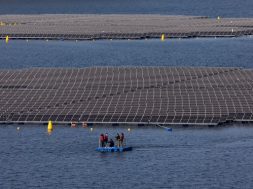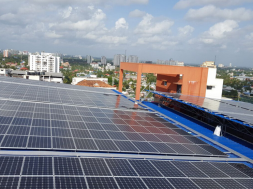
Manu Shrivastava, an IAS officer of the 1991 batch, is an electrical engineer by training. A graduate of IIT Delhi, he had secured the 19th All-India Rank in the fiercely competitive IIT JEE.
Shrivastava is presently the principal secretary of the New and Renewable Energy Department and MD of MP Urja Vikas Nigam.
During his tenure, MP stood first among all the states in renewable energy projects commissioned in 2015-16, accounting for 24 percent of the total projects in the country. MP also topped in Wind Energy projects commissioned in 2015-16, with 40 percent of the total projects being commissioned in the state. In the year 2015-16, the renewable energy capacity of the state doubled from 1500MW to 3000MW.
He talked animatedly about the department and its achievements in a conversation with Free Press
What is your most remarkable achievement?
My most remarkable achievement is transforming the solar energy scenario in the state. Till now, procurement of solar energy was being done by mega organisations of the Government of India, namely, National Thermal Power Corporation (NTPC) and Solar Energy Corporation of India (SECI), wherein they used to ask developers to bid for Viability Gap Funding (VGF) support for supplying power at the target rate of Rs 4.50 per unit.
As the chairperson of Rewa Ultra Mega Solar Ltd, I created a project structure, wherein solar power is available, without any VGF (subsidy) support, at Rs 2.97 per unit.
This has been a game-changer for the country, and the Government of India has asked NTPC and SECI to suspend all tenders indefinitely, till they are brought in line with the Rewa project.
Tell us something more about the Rewa project.
The 750MW project is one of the biggest in the world. It is the first project in the country which will supply power to an inter-state open access customer, namely Delhi Metro.
The project has many unique features that led to participation by six foreign companies including Softbank Japan, eNGie France, Enel Italy, Sembcorp Singapore, Solenergi Mauritius and Canadian Solar, as also 14 Indian companies, with a total bid for 7500MW, ten times the capacity of 750 MW.
What is your mission as head of the Urja Vikas Nigam?
My mission is to promote and create awareness about the uses of solar, wind, biomass, biogas, renewable energy and energy-efficient products based technologies among the public and to promote policies and programmes necessary for popularising the applications of various new and renewable energy technologies. Also, I want to promote green building design for efficient use of energy in housing, commercial and industrial sectors and power plants based on renewable energy sources for Energy Security.
What is the long-term objective of the Nigam?
To facilitate sustainable generation of green and quality power for the people of the state through new and renewable energy sources and to conserve the environment by promoting the energy efficiency and conservation measures and devices in the state.
Which are the upcoming projects in the state?
Two major projects are under implemented, which are surely going change the life of the people.
The first is the CM Solar pump Scheme, which will be implemented in those remote areas where power distribution companies do not have infrastructure for energising electrical pumps and in the districts, where the commercial losses of power distribution companies are quite high. The government plans to distribute around 5,000 solar pumps with an average of 100 pumps for each district.
The subsidy is the main attraction in the scheme. It is 90 per cent up to 3 HP pumps and 85 per cent up to 5 HP ones. Technical bid is under process and very shortly the financial bid will be opened.
The second is the Roof Top Solar Panel project under which any person can install his own power generation unit from 1 to 100 KW. The government give 30 percent subsidy. The cost of one KW unit is around Rs 70,000.















